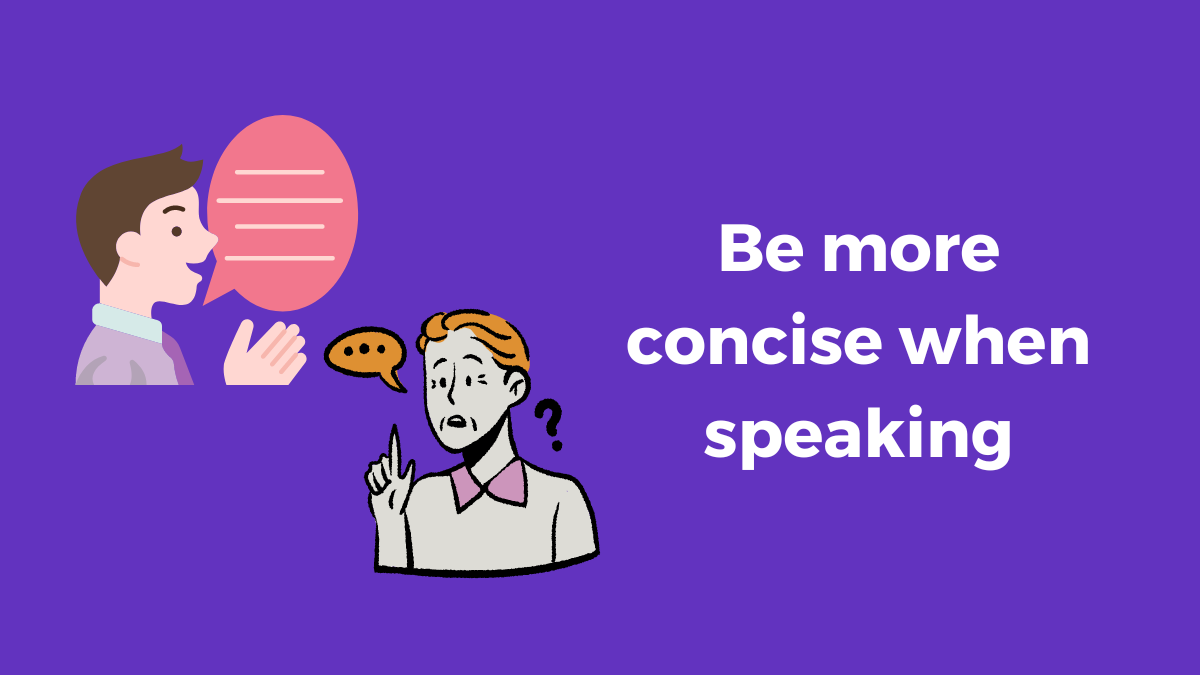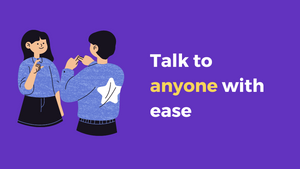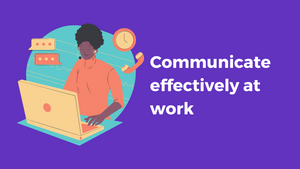
How to be more concise when speaking
Speaking concisely is one of the important parts of effective communication. It became more important because according to recent studies, the average human attention span is dropped to 8 seconds only.
Making yourself concise can increase the retention of your audience.
Table of Contents
Know your audience
An important aspect of effective communication is knowing your audience. So you can focus on the information relevant to your audience.
Knowing your audience means identifying their background, area of interest, and job titles.
Plan and Organize your message
Planning your message can help you to make it more effective and concise. It can increase your confidence if you try to practice it.
Techniques for structuring your message
Here are some techniques to structure your message concisely.
- Identify your purpose - What is the purpose of your message? What do you want to archive by communicating your message? Are you sharing information, asking for help, or requesting something?
- Use a clear and concise opening - Try to state your purpose in the opening of your message. This will give an idea to the audience that what your message is about.
- Break your message into sections - If your message is long then try to break it into the section. If it's written then make headings and subheadings. It will help the audience to understand your message.
- Use bullet points - If your message is written then try to use bullet points. If your message is broken into the list, it will be more concise.
- Use a clear closing - Closing is as important as opening. Summarize your message and restart the purpose of your message. It will insure that the audience understands the message.
- Edit and revise - It is always a good practice to revise your message and edit it accordingly. Or if it's spoken communication then you can practice it.
Practice Active Listening
Actively listening while speaking with someone can take your communication to another level. It means we are giving the person speaking full attention.
It means not only hearing what the person saying but also paying attention to their body language, tone, and emotions.
Techniques for improving your active listening skill
- Pay attention - Give attention to the person speaking and maintain eye contact.
- Show Interest - Show that you are interested in the conversation by asking relevant questions and maintaining your body language.
- Ask to Clarify - Sometimes we don't get what the other person is saying. So ask him/her to clarify it for you.
- Paraphrase - Repeat the person's message in your own words to ensure that you have understood it correctly.
- Reflect - You can show empathy and reflect on the person's emotions by acknowledging their feelings.
- Respond - Always respond appropriately and share your thoughts if needed.
Choose Your Words Carefully
Language is an important part of communication. The words we choose and how we use them can change the flow of communication or create misunderstandings.
Tips for using clear and simple language
- Avoid jargon - Jargon refers to the terminology (shorthand words) used in a specific field. For example, people in the programming field often use the words "MVC", "Web3", "IDE", and "API". These words are the jargon related to the programming field. Always try to avoid jargon or define it clearly if necessary.
- Use Active voice - Active voice is more direct than passive voice. It makes it easier to understand your message.
- Breakup long sentences - Breaking a long sentence into a few shorter sentences can make your message easier to understand.
- Use simple vocabulary - Always try to use everyday/simpler words. Only use complex vocabulary if it's necessary.
- Consider your audience - Try to adjust your language according to your audience. Use the language according to your audience's level of understanding and background knowledge.
How to avoid common communication pitfalls
- Avoid making assumptions - Instead of assuming what others are thinking, Ask questions and ensure that you understand their message.
- Avoid being defensive - If you are being defensive then your audience will be defensive and it will create a barrier in your communication. Instead listen actively, clarify, and respond accordingly.
- Avoid Interrupting - Interrupting someone can be disrespectful and make them feel like their message is not valued. Instead, allow the person to finish.
- Avoid Using vague language - Using vague language can create misunderstanding. Use clear language.
- Avoid Using negative language - Using negative language can create defensiveness in communication. Try to avoid it if possible.
- Avoid Not being empathetic - Empathic is an important part of concise communication. So try to see things from the speaker's perspective.
Use Nonverbal Communication
Nonverbal communication is also an important part of effective communication. Nonverbal communication, such as tone of voice, facial expressions, eye contact, and body language. It can convey meaning and emotion along with verbal communication.
Techniques for improving your nonverbal communication
- Body language - Body language can convey emotions and attitudes, so use appropriate body language. Such as setting straight or using open gestures.
- Maintain eye contact - Try to maintain eye contact with your audience. Good eye contact indicates that you are engaged in communication.
- Mirror the other person's body language - Try to mirror the other person's body language. It creates trust subconsciously. But try not to overdo it.
Embrace Silence
Silence is a powerful tool if used correctly. Using silence instead of filler words can make communication concise.
The power of silence in communication
- Emphasizing a point - A tiny pause after a statement can emphasize the importance of that statement. It also gives your audience time to process the message.
- Showing respect - Taking a moment after someone speaks shows that you are processing their message and taking the words seriously.
- Creating space for reflection - Silence can create reflection. It allows both parties to process the conversation. It is especially important in emotional communication.
- Drawing attention - Pausing before a statement will draw your audience's attention to you.
How to avoid filler words and phrases
- Be aware of your habits - You should be aware of your filler words habits. Try to record yourself in a conversation and note down the filler words.
- Practice pausing - Try to take moment before you speak instead of using filler words. It will allow you to gather your thoughts and deliver a concise message.
- Be confident - We often use filler words when we are uncertain. Practice your communication skills and be confident in your message.
- Take breaks - If you fill like you are slipping into the habit of filler words, take a break, take a deep breath, and refocus your thoughts.
Overcome Common Communication Challenges
There are many communication challenges, While we can not deal with all of them we can overcome some common communication challenges.
How to handle difficult questions and comments
- Stay Clam - When faced with a difficult question or comment try to stay calm. Take a moment, and gather your thoughts with a deep breath.
- Listen carefully - Listening carefully and understanding the question from their perspective is important.
- Clarify the question or comment - Ask for clarification if needed. This can help you to understand the question or comment and respond appropriately.
- Acknowledge - Acknowledging the other person's concerns or feelings can reduce the tension, and create a more positive environment.
- Respond with confidence - Always try to respond with confidence. Avoid being defensive and try to use examples to explain your point.
- Be honest - No person knows everything, so be honest if you don't know the answer. You can always offer to follow up with more information later.
- Redirect the conversation - Many times the question or comment is not relevant to the topic in the conversation. So you can redirect the conversation to the main topic.
How to deal with nerves and anxiety
- Prepare and practice - As you already know that practice makes a man (Person) perfect. Preparing and practicing before your speech can boost your confidence and reduce anxiety. You can also prepare for the possible questions.
- Focus on your breathing - Deeb breathing exercises can help you to calm yourself and reduce anxiety. For example - Take a deep breath, hold it for a few seconds, and exhale slowly.
- Visualize - Visualizing is a great power. Try to visualize yourself having positive communication, and delivering a successful speech.
- Use Positive self-talk - Positive self-talking can help boost your confidence. Remind yourself of your past success and your strengths.
- Take breaks - Give yourself a break. Go on a short walk, stretch, or do something you enjoy. (P.S. - I watch light Anime and go on a walk)
- Seek Support - Seeking support is not a bad thing. Ask for help from your friends, family, colleagues, and therapist if needed. Talking to someone can help you.
Conclusion
With enough practice, you can master concise speaking. Practice your message beforehand, know your audience, listen actively, don't use filler words, and use silence to take your communication skills to the next level. If needed seek support from your loved ones.




